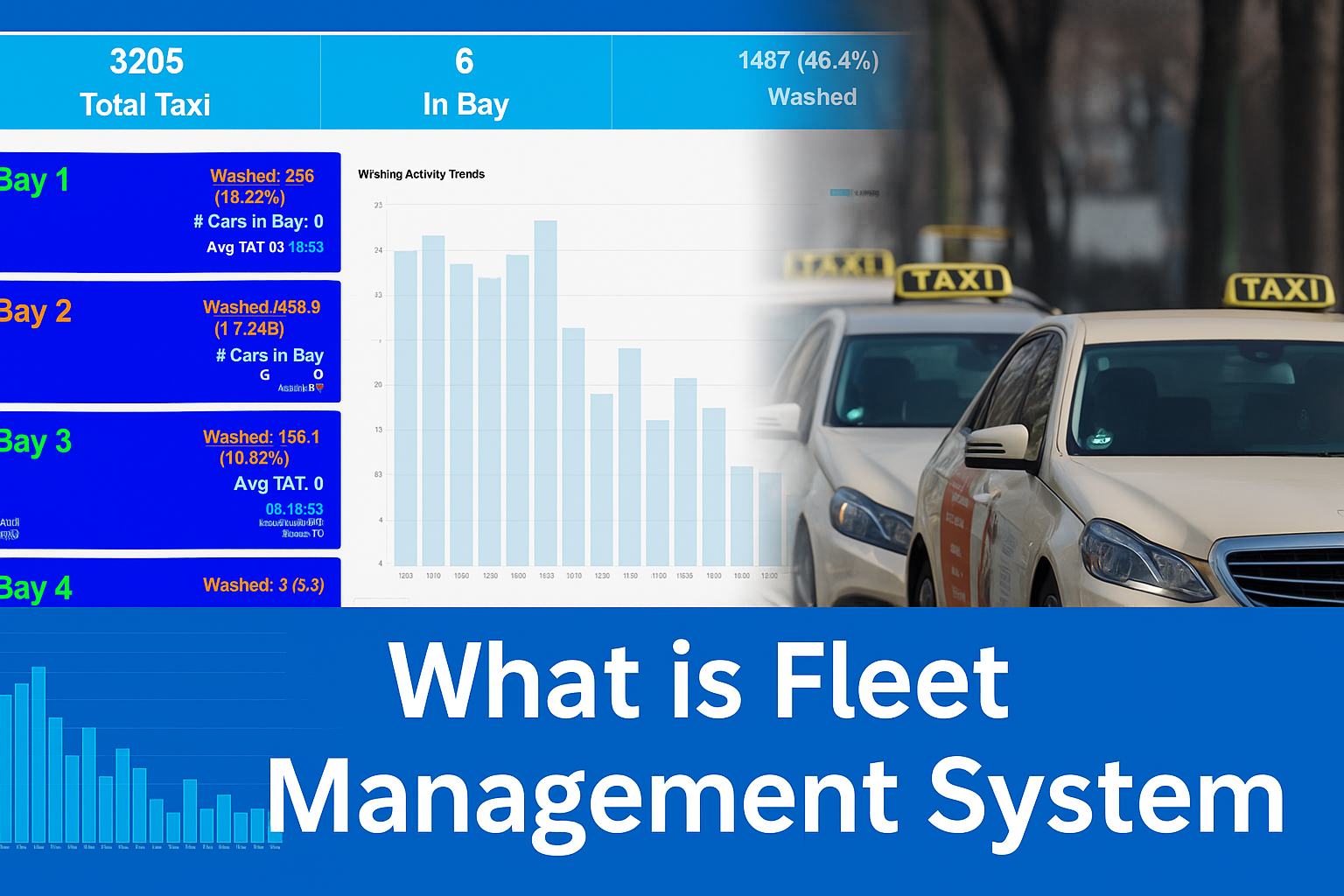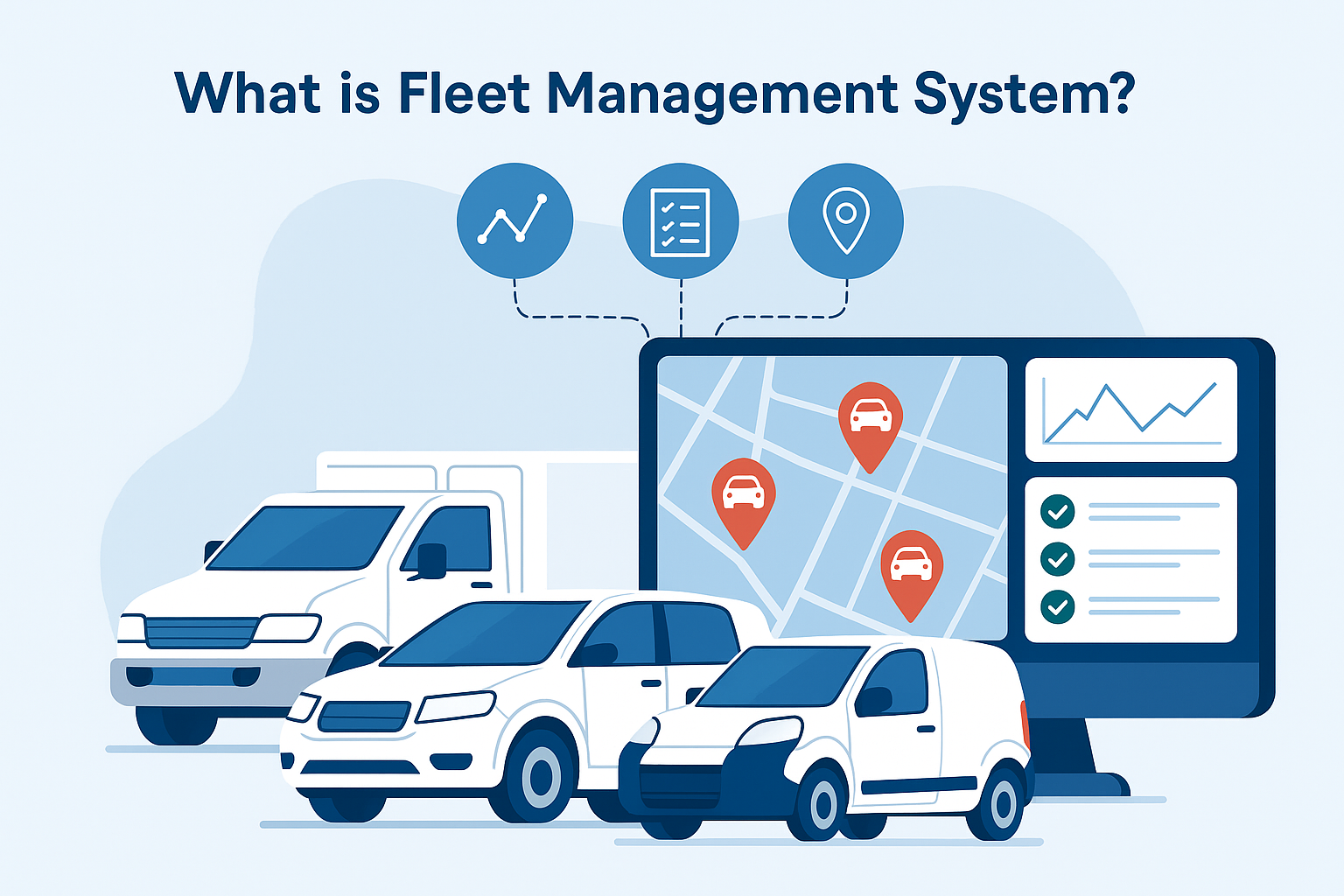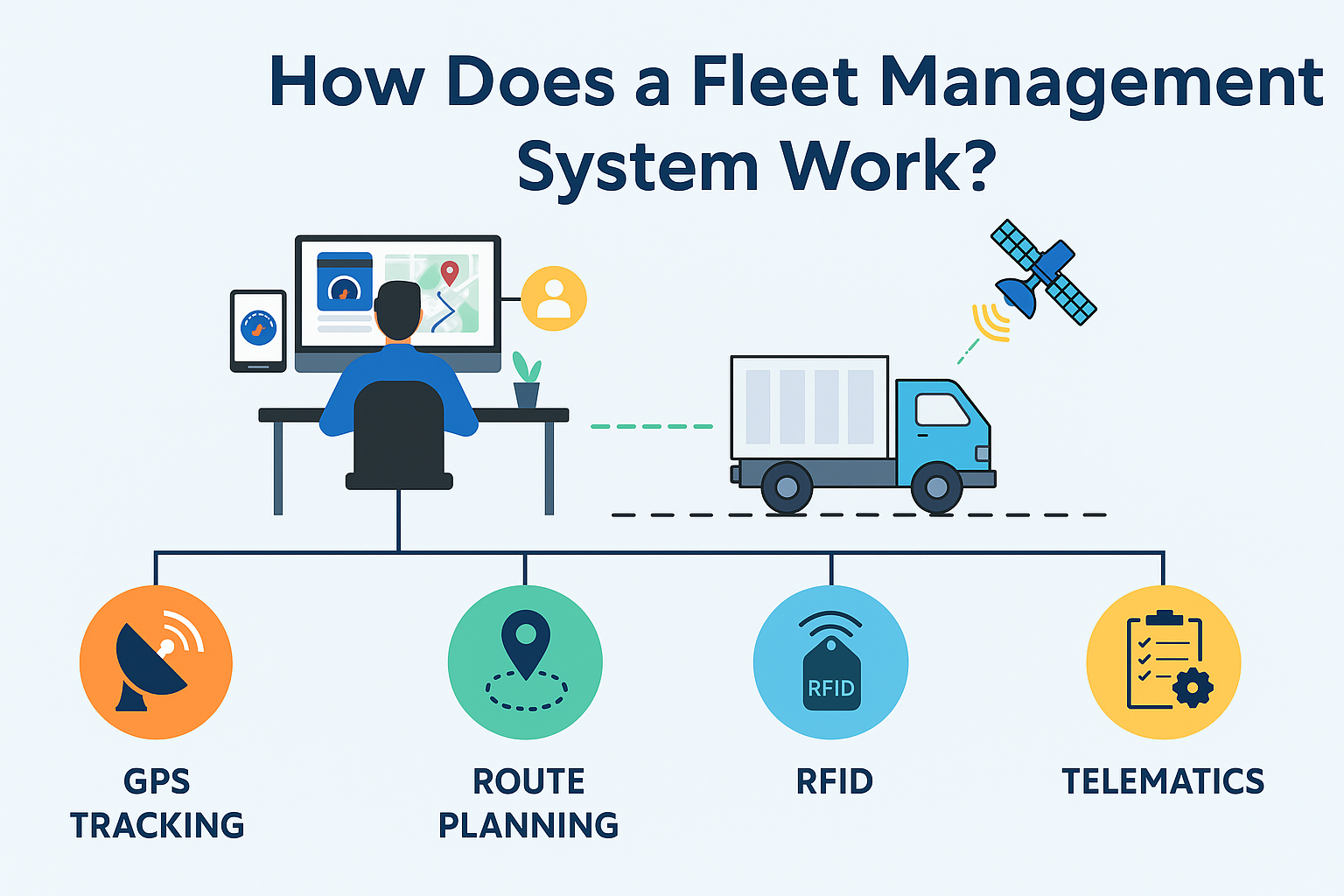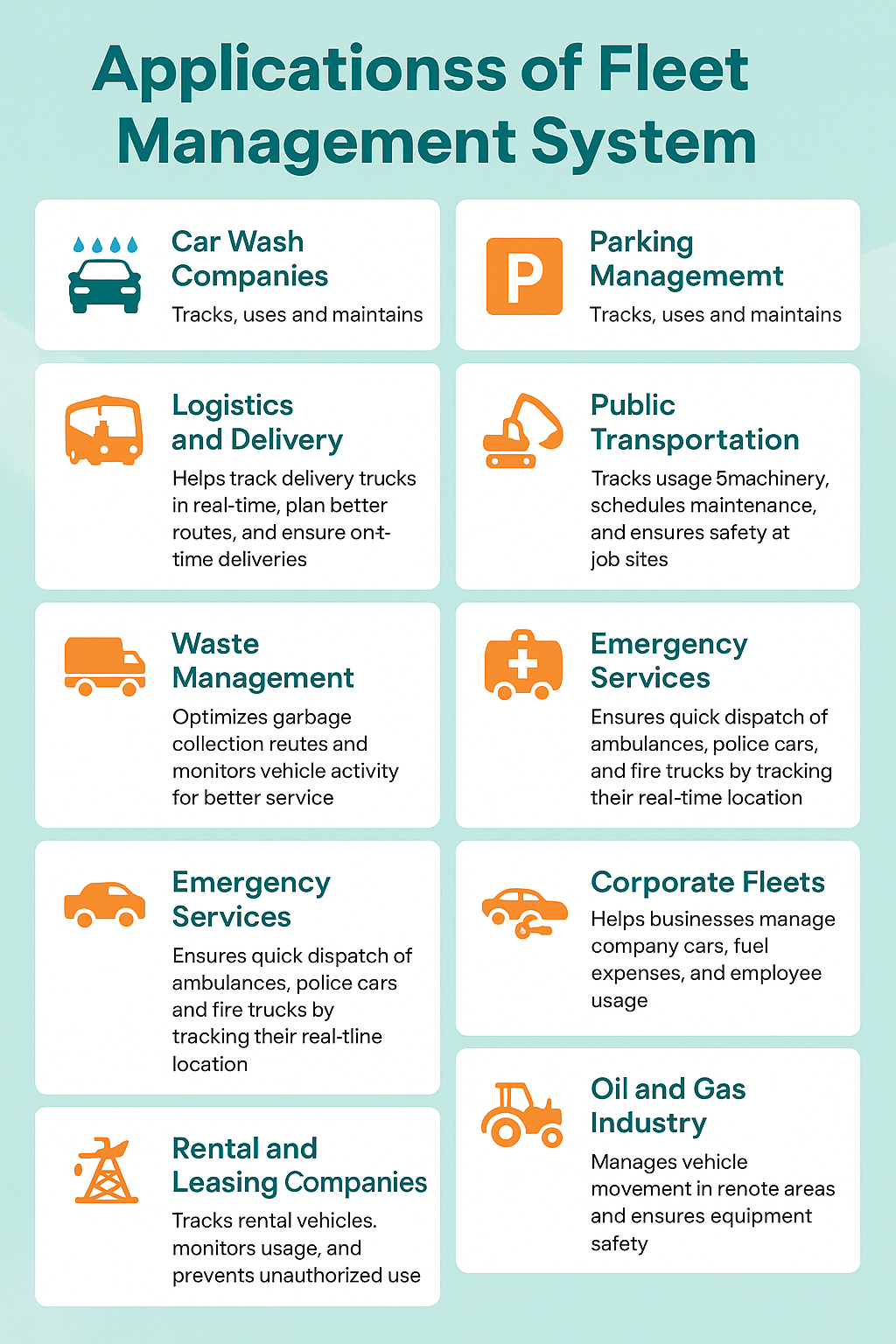What is Fleet Management System? How it Works and Benefits Explained
14-04-2025

If you run a car rental service, manage a truck fleet, offer car washing, or operate delivery vans, you already know how hard it can be to keep track of every vehicle.
This gets even more challenging when you also manage school buses, office cars, construction trucks, or even government vehicles like police cars or garbage trucks.
There’s a lot to handle — from keeping an eye on parking spots, checking if the vehicles are washed, knowing who is driving, to making sure no one uses the cars without permission. This is where a Fleet Management System really helps.
A Fleet Management System is a smart tool that helps you manage all your vehicles in one place.
It gives you full control to track your fleet, whether they are parked or on the road.
You can also check if drivers are following routes, make sure vehicles are used properly, and avoid any misuse. Whether you own a few cars or handle hundreds of vehicles, this system keeps everything organized, updated, and easy to manage.
- A Fleet Management System helps you track all your vehicles in one place. You can check if they’re parked or moving, see which driver is using them, and make sure everything is being used the right way.
- If you manage parking areas for tenants, visitors, or employees, the fleet management system shows you who entered, where they parked, and when they left. It also helps stop people who shouldn’t be there.
- For businesses that find it hard to keep track of their vehicles or forget which one needs service, the system makes everything easier by showing live updates and reminders.
- With a Fleet Management System, you can save money, reduce delays, use less fuel, and make smarter choices. It’s like having a smart helper that keeps your fleet running smoothly every day.
Visit TimeChart’s RFID Car Management System Dubai, UAE
What Is Fleet Management System?

A Fleet Management System (FMS) is a powerful tool that businesses use to oversee and manage all parts of their vehicle operations. It allows companies to keep track of their fleet—no matter how many vehicles they have—efficiently and in real-time.
With an FMS, companies can monitor key aspects of their fleet, such as the location of vehicles, their status, and their overall performance. It also provides valuable insights, such as fuel consumption, maintenance schedules, and driver behavior. By having all this data at your fingertips, businesses can improve their operations and boost productivity.
An FMS works by combining hardware and software to store, process, and analyze a wealth of information.
This includes details like vehicle wash status, parking status, driver behavior, fuel consumption, vehicle speed, mileage, and more.
With TimeChart's RFID Fleet Management System, RFID (Radio Frequency Identification) tags and readers are used to automatically track the movement of vehicles.
These tags are placed inside each vehicle and communicate with readers at entry/exit points or parking areas, making it easy to track vehicle locations and histories without having to update everything manually. The information is then displayed in real-time on a software dashboard.
- An FMS provides real-time insights and tracks important metrics like fuel consumption, maintenance schedules, and driver behavior to improve efficiency and productivity.
- TimeChart's RFID Fleet Management System uses RFID tags and readers to track vehicles automatically, updating the information in a software dashboard, eliminating manual tracking and paperwork.
- The software processes collected data, helping managers spot inefficiencies, assess fleet performance, and make informed decisions, while also enabling direct communication with drivers.
- Maintenance scheduling is automated, allowing the system to generate schedules based on factors like mileage or engine hours, helping prevent breakdowns, reduce repair costs, and extend vehicle lifespan.
How Does a Fleet Management System Work?

A Fleet Management System works like a smart helper that tracks and manages all your vehicles without the need for paperwork or guesswork. It uses special tools to watch over everything in real time — from where the vehicle is to how it's running. Here’s how the system works in a simple and clear way:
RFID Tags on Every Vehicle
Each vehicle in your fleet gets a small RFID tag. This tag has a unique ID number just for that vehicle. Think of it like a name tag for cars, vans, or trucks.
RFID Readers at Key Spots
These readers are placed at important locations like entry gates, exits, parking areas, and maintenance zones. They act like scanners that automatically read the tag as the vehicle passes by.
Automatic Detection
When a vehicle drives near a reader, the system instantly picks up its tag. You don’t need to press any buttons or scan anything manually — it all happens by itself.
Live Updates to the Software
As soon as a tag is read, the reader sends important info like vehicle ID, time, and location to the fleet management software. The software keeps everything updated in real time.
Track Every Move in Real-Time
From your dashboard, you can see where each vehicle is, when it was checked in or out, and whether it's parked, on the move, or due for maintenance. You get to monitor your entire fleet in just one place.
Smart Dashboard for Managers
The Fleet Management system gives you an easy-to-use dashboard where you can view all vehicle statuses, check reports, and keep track of upcoming maintenance tasks. It helps you stay in control without wasting time.
Automatic Check-In and Check-Out
When a vehicle enters or exits the premises, the system records the time automatically. There's no need for anyone to log it manually, which saves a lot of time and prevents human mistakes.
Stops Unauthorized Use
If someone tries to use a vehicle without permission or during off-hours, the system can alert the manager. This keeps your fleet safe and prevents vehicles from being misused or stolen.
Keeps Maintenance on Track
The fleet management system monitors how far a vehicle has traveled and how many hours it has run. Based on this, it sets reminders for oil changes, inspections, or other important services so your vehicles stay healthy and reliable.
Tracks Fuel Usage to Cut Costs
The Fleet Management System also tracks how much fuel each vehicle uses. If there's too much fuel being used, the system can find the reason — maybe a driver is idling too long or driving too fast. With this data, companies can reduce fuel costs and improve how their vehicles are used.
Benefits of Fleet Management Systems
Using a Fleet Management System gives businesses many helpful benefits. It makes daily tasks easier, cuts down on costs, and helps keep everything safe and efficient. Here are the key advantages:
✅ Faster Processes & Real-Time Tracking
- Speeds Up Work: Automates check-in/check-out and vehicle tracking without paperwork.
- Prevents Delays and Disputes: Tracks return times and usage clearly, reducing confusion or arguments.
- Stops Theft: Sends alerts if vehicles are used without permission.
- Keeps Cars Clean and Maintained on Time: Helps schedule vehicle washes and services to prevent breakdowns.
- See Everything in Real Time: Know the exact location and condition of each vehicle through GPS and RFID.
- Track Automatically with RFID: Entry and exit times are recorded without needing manual check-ins.
- Monitor Everything from One Dashboard: Get a full view of your fleet using a single, easy-to-read dashboard.
⚙️ Improved Efficiency & Operations
- Smarter Route Planning: Create routes using real-time traffic and delivery data to save time and fuel.
- Manage the Yard Easily: Find and move vehicles faster in large parking areas with RFID tracking.
- Automate Important Tasks: Handle inspections, maintenance, and reports automatically.
- Reduce Idling Time: Track when vehicles are left running too long and improve driver behavior.
- Faster Dispatching: Quickly send the right vehicle to the right job by checking real-time locations.
- Track Inventory Too: Use RFID to manage vehicle parts and supplies needed for repairs.
💰 Cost Reduction
- Save on Fuel: Better routes and less idling lead to big fuel savings.
- Lower Repair Costs: Regular service based on actual use helps prevent big breakdowns.
- Cut Down on Labor: Less paperwork and more automation means fewer hours spent on manual work.
- Lower Insurance Costs: Safer driving and theft prevention can reduce insurance rates.
- Prevent Vehicle Theft: GPS and geofencing help stop vehicles from being misused or stolen.
🛡️ Safety & Legal Compliance
- Track Driver Behavior: Spot risky habits like speeding or harsh braking and offer training.
- Fewer Accidents: Real-time alerts and coaching programs help drivers stay safer on the road.
- Stay Compliant: Keep track of driver hours, vehicle service, and usage to meet legal rules and avoid fines.
- Promote a Safer Culture: Help drivers build good habits, which protects your team and your business.

What Does a Fleet Manager Do? And How They Can Use a Fleet Management System to Optimize Operation and Reduce Cost
A Fleet Manager is the person who takes care of everything related to a company's vehicles. This includes planning, tracking, scheduling, and making sure every vehicle is used safely, efficiently, and cost-effectively.
✅ Main Responsibilities of a Fleet Manager:
- Track Vehicles: Know where all vehicles are at any time.
- Plan Routes: Choose the fastest and most fuel-efficient roads.
- Check Driver Behavior: Watch how drivers handle vehicles to ensure safety.
- Schedule Maintenance: Make sure vehicles are serviced on time to avoid breakdowns.
- Manage Fuel Use: Track how much fuel is being used and find ways to reduce it.
- Prevent Misuse: Keep vehicles from being used without permission.
- Keep Records: Store details like mileage, trips, fuel logs, and driver hours.
🚀 How a Fleet Management System Helps Fleet Managers
A Fleet Management System (FMS) makes the job easier by using smart tools like RFID, GPS, and tracking software. Here’s how it helps:
- Real-Time Vehicle Tracking: See where every vehicle is, which helps in faster dispatch and route planning.
- Automatic Check-In/Check-Out: RFID readers record vehicle entry and exit without manual work.
- Fuel Monitoring: Tracks fuel usage and finds ways to save by spotting issues like idling or speeding.
- Driver Behavior Monitoring: Alerts managers about risky actions like harsh braking or sudden acceleration.
- Maintenance Alerts: Automatically reminds when a vehicle needs service, based on time or mileage.
- Report Generation: Gives instant reports on fleet performance, fuel costs, and usage history.
💰 How It Reduces Cost and Boosts Efficiency
- Lower Fuel Costs: Better routes and driver habits reduce fuel waste.
- Fewer Repairs: Regular maintenance prevents expensive breakdowns.
- Less Paperwork: Automated data saves time and reduces manual errors.
- Less Theft or Misuse: Alerts help stop unauthorized vehicle usage.
- Improved Productivity: With everything tracked and planned, managers save time and can focus on bigger goals.
Improved Efficiency:
A Fleet Management System enhances efficiency by optimizing routes, monitoring fuel usage, and streamlining maintenance. This results in better resource management, reducing wasted time and fuel, and improving overall fleet performance.
✅ In short: A fleet manager ensures everything runs smoothly. And with a Fleet Management System, they can do it faster, safer, and cheaper.
Challenges Faced by Fleet Managers and How TimeChart Can Help Them No Matter What Fleet Size They Have
Fleet managers handle a lot every day, and managing a fleet — whether it's 5 vehicles or 500 — comes with real challenges. These problems can affect time, cost, safety, and overall business performance. But with TimeChart Fleet Management System, these issues become easier to handle, no matter the size of the fleet.
🛠️ Common Challenges Fleet Managers Face:
- Lack of Real-Time Tracking: It’s hard to know where vehicles are at all times, which causes delays and confusion.
- Manual Check-In/Check-Out: Using paper logs or spreadsheets is slow and prone to mistakes.
- Unauthorized Vehicle Use: Vehicles may be used outside work hours without permission.
- Missed Maintenance: Forgetting regular service leads to breakdowns and high repair costs.
- Fuel Wastage: Without proper tracking, fuel consumption gets out of control.
- Driver Behavior Issues: Speeding, hard braking, or long idling times can reduce safety and increase costs.
- Poor Reporting: It’s difficult to get quick insights into fleet performance without automated reports.
✅ How TimeChart Solves These Challenges for Fleets of Any Size:
Whether you have a small business fleet or a large logistics operation, TimeChart's RFID Fleet Management System offers the right tools:
- Real-Time Vehicle Location: Always know where your vehicles are with GPS and RFID tracking.
- Automatic Check-In/Check-Out: RFID readers record vehicle movement, saving time and reducing human errors.
- Unauthorized Usage Alerts: Get instant notifications if a vehicle is used outside permitted hours.
- Smart Maintenance Scheduling: Set maintenance based on mileage, engine hours, or time — and get reminders.
- Fuel Monitoring: See how much fuel each vehicle uses and find ways to save.
- Driver Behavior Tracking: Identify unsafe driving habits and improve safety with real-time data.
- Easy Dashboard & Reports: View everything from one place — no need for manual logs or messy spreadsheets.
📌 No matter the fleet size, TimeChart helps you stay in control, cut costs, and boost efficiency with less effort.
Transform Your Business Process with TimeChart - Request a Free Demo
See TimeChart Work Time Software in action by scheduling a demo. Our team can create custom implementation plans to suit your business needs and show you how TimeChart can transform your Business Process. Contact us Now!
Why Choose Timechart?
Timechart’s advanced yet simple tools are designed to meet the unique needs of businesses in the Middle East. It ensures compliance with local labour laws, enhances operational efficiency, and promotes transparency at every level. Whether managing fleets, unpaid leave, streamlining attendance tracking, or improving employee satisfaction, Timechart stands out as an invaluable tool for modern workforce management.
Check out Time Attendance System Dubai
Check out Best Time Attendance System Brands in Dubai to Choose
FAQs about Fleet Management System
1. What is a Fleet Management System?
A Fleet Management System (FMS) is a smart tool that helps businesses track, manage, and take care of their vehicles. It uses software and devices like GPS and RFID to give real-time updates about each vehicle.
2. How does a Fleet Management System work?
The system uses GPS, RFID tags, and sensors to collect data from each vehicle. It tracks location, fuel use, speed, and maintenance needs, then shows this info in one easy dashboard.
3. Why is fleet management important for businesses?
Fleet management helps companies save money, improve safety, track vehicles, and plan better routes. It also helps avoid delays, breakdowns, and wasted fuel.
4. Can small businesses use a Fleet Management System?
Yes! Fleet Management Systems work for small, medium, or large fleets. Even if you have only a few vehicles, it can help you manage them better and save time.
5. What are the main features of a Fleet Management System?
Some key features are real-time vehicle tracking, automatic check-in/out, fuel monitoring, maintenance reminders, driver behavior alerts, and detailed reports.
6. How does RFID help in fleet management?
RFID tags are placed in vehicles. When a vehicle passes a reader, it sends info like entry time or exit time. This makes check-ins automatic and accurate, without paperwork.
7. Can the system help reduce fuel costs?
Yes! It tracks how much fuel each vehicle uses and alerts you to waste, like too much idling. This helps reduce fuel costs and improve driver habits.
8. Is the Fleet Management System easy to use?
Yes, the system is user-friendly. It shows all info on a simple dashboard, so fleet managers can see everything clearly and make smart decisions fast.
9. Can it prevent unauthorized vehicle use?
Absolutely. The system sends alerts if a vehicle is used at odd hours or in the wrong place. This keeps your fleet safe and secure.
10. What are the benefits of using TimeChart’s Fleet Management System?
TimeChart offers real-time tracking, RFID automation, fuel reports, driver safety alerts, and easy maintenance scheduling — all from one powerful platform, no matter your fleet size.
Conclusion
A Fleet Management System is not just a tool — it’s a complete solution that helps businesses save time, reduce costs, and run their vehicle operations smoothly. Whether you have a few cars or a large fleet, using smart technologies like GPS, RFID, and real-time tracking can improve safety, boost efficiency, and prevent problems before they happen.
With TimeChart’s Fleet Management System, you get everything in one place — from automated check-ins to fuel monitoring and maintenance reminders. It’s easy to use, works for any fleet size, and gives you full control over your vehicles. So if you're ready to make smarter decisions and grow your business with less stress, TimeChart is here to help.
Other Services we Offer in Dubai
Tally PrimeCCTV installation in Dubai
Software development
App development
HRMS software
Tally software for accounting
IT AMC in Dubai
Data centers in Dubai
Access control system
Endpoint security in Dubai
Firewall Security in Dubai
Structured cabling in Dubai
Appsanywhere: Web Based App
Performance Management System
Time Attendance System Software
Smart Visitor Management System
Drone Camera Price in Dubai
Drone Camera Price in Saudi Arabia
Buy High-Resolution Satellite Imagery
DJI Store in Dubai
Best Billing Software and Invoicing Software
RECENT BLOG
Top 10 Best Electrical Stores in UAETop 10 Best Wooden Pallet Suppliers in UAE
Cheapest Supermarkets in Dubai for Groceries
Recruitment and Employment Agencies in Dubai, United Arab Emirates
Top Facility Management Companies in Dubai, UAE
Weekdays and Months in Arabic for Employees Working in Arab Countries
10 Best Electrical Supply Stores in Dubai, UAE
Top 10 UAE Steel Companies
Limited Contract Resignation UAE
Probation Period in the UAE
UAE Labor Card: Everything You Need to Know
Leave Salary Calculator UAE
Which Countries Have a Friday-Saturday Weekend in the Arab World?
New Public Holidays, Weekends, and Leave Types in Oman
New Public Holidays, Weekends, and Leave Types in Bahrain
New Public Holidays, Weekends, and Leave Types in Qatar
New Public Holidays, Weekends, and Leave Types in Saudi Arabia
Sick Leave UAE Labour Law
Unpaid Leave UAE Labour Law
Why Tally Prime is the Best Accounting Software for Businesses in Dubai
Best SEO Services in Dubai
Free Box Shadow CSS Generator Online
Hyperlink HTML Generator Online Free
HTML Table Generator Free Online
Word Counter Arabic
Free Amount to Words Converter Online
Best Drop Shadow Generator Free Online